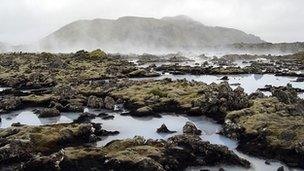UK in talks with Iceland over 'volcanic power link'
- Published

Iceland's location and geography means that it is a leading producer of geothermal energy
The UK is to hold talks with Iceland about harnessing the power of its volcanoes to import energy.
Ministers are discussing the idea of building a giant undersea cable to pump some of Iceland's plentiful supply of geothermal energy to the UK.
Energy Minister Charles Hendry, due to visit Reykjavik next month, said Iceland was "very keen" on the idea.
He told <link> <caption>the Guardian</caption> <url href="http://www.guardian.co.uk/environment/2012/apr/11/iceland-volcano-green-power?intcmp=122" platform="highweb"/> </link> such cables, known as interconnectors, would be crucial to the UK as it produced less energy.
The UK has access to two existing international interconnectors - to France and the Netherlands - while nine more are currently either being built or considered.
If all of these are completed, they could end up meeting a third of the UK's annual electricity demand.
Any cable link between the UK and Iceland would be the longest of its kind in the world, at up to 930 miles (1,500km).
'Volcano power'
Geothermal energy, often dubbed "volcano power", is extracted from the heat stored in the Earth's core and is abundant in Iceland and other parts of the world close to tectonic boundaries.
Iceland has five geothermal plants, supplying about a fifth of the country's energy supply and 85% of all heating and hot water to buildings in the country.
Mr Hendry has already met the head of Iceland's national grid to discuss the idea and is scheduled to speak to his counterpart in the Icelandic government next month.
The UK is concerned about the risk of an "energy gap" in the middle of the next decade when existing nuclear power plants are decommissioned.
Production of North Sea oil and gas - on which the UK has depended on for so long - is falling, and there is uncertainty over future investment in new nuclear capacity and renewable industries.
Mr Hendry told the Guardian that the UK would be dependent on imported energy from a variety of sources in the future, and tapping into a "supergrid" of interconnectors planned across Europe would be "an absolutely critical part of energy security and for low-carbon energy".
"We are in active discussions with the Icelandic government and they are very keen," he said.
'Ambitious idea'
The Department of Energy and Climate Change said the idea was "very ambitious and had a long way to go".
But a spokesman said Iceland had untapped supplies of geothermal energy, and interconnectors were seen as a "perfect way" of offsetting the development of wind power in the UK - providing energy when domestic output was low and allowing firms to sell excess capacity at other times.
"We are investigating the idea because interconnectors have an important role to play in the UK's future energy situation," he said.
An interconnector link between the Republic of Ireland and Wales is due to open later this year.
Other schemes in the pipeline include a link between England, Alderney in the Channel Islands, and France and a proposed 560-mile (900km) link between England and Norway to harness tidal and wind power respectively.
Supporters of interconnectors say they will enable the UK to get access to the cheapest energy at any given time, keeping the cost of domestic bills down as well as helping to meet carbon-reduction targets.
Although the UK-Dutch link cost £500m, energy firms say they are commercially feasible without subsidies while environmental groups say interconnectors are more cost-effective than building new plants.
But sceptics say changing weather patterns across Europe, and competition for access to interconnectors, mean there is still a need for additional "back-up" power plants in the UK.
- Published10 June 2011